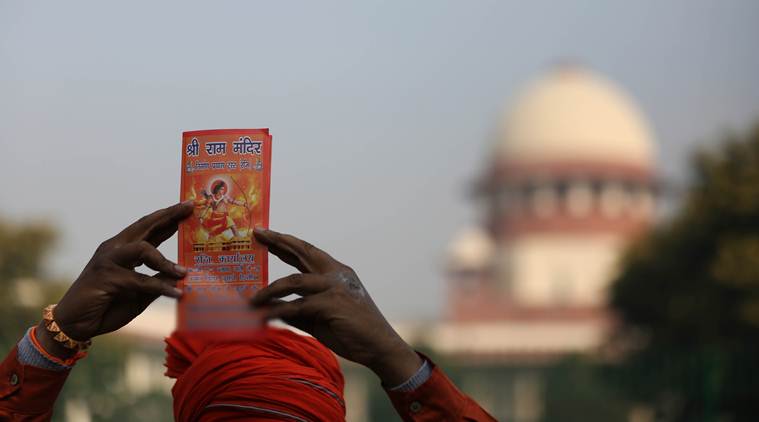The road to a closure
Supreme Court’s order asking for a panel to mediate the Ayodhya dispute could be the harbinger of a win-win situation for both sides.

Ayodhya literally means land without war. Ironically the Ayodhya dispute, over building a temple or reconstructing a mosque on a piece of land claimed by both sides, has caused many a violent act over the Subcontinent’s length and breadth. From the violence during L K Advani’s Rath Yatra in 1989, to the riots in India, Pakistan and Bangladesh when the Babri Mosque was brought down in 1992, to the Bombay riots of 1993 and the Gujarat riots of 2002, the toll on human life and property has been colossal. And yet the problem seems to persist, with the matter meandering through the legal system. In 2010, the Allahabad High Court decided the suits between the parties by partitioning the land into three portions.
The solution satisfied no one and all parties appealed to the Supreme Court. The judgment of the Allahabad High Court ran into a few thousand pages, but the exhibits and record ran into several thousand more. To tie down three or more judges of the Supreme Court, to hear an appeal for months together is not a feasible proposition, in a court with a high attrition rate among judges. It is against this backdrop that we must evaluate the recent Supreme Court order, asking a panel of mediators to mediate the dispute, within a period of eight weeks.
The mediators are men of eminence. The chairman, Justice F M I Kalifulla has served with distinction on the Supreme Court. Sriram Panchu is a senior advocate, who has pioneered mediation as an alternative dispute resolution mechanism in this country. Sri Sri Ravi Shankar has come a long way from his initial days with Mahesh Yogi. However, one possible criticism of the panel’s composition is the lack of a woman on it. The panel has to hold sittings in Faizabad and submit a status report within four weeks and try to resolve the issue within eight weeks.
To the untrained mind, mediation is simply a judgeless negotiation. To many minds, the problem in Ayodhya cannot be negotiated. On the Hindu side, some feel that while representing the infant deity, Ram Lalla, they lack authority to abandon any claim on his behalf. On the Muslim side, there are those who say that the land on which the mosque stood was dedicated to Allah in perpetuity and no human can willingly sign away anything that is owned by Allah almighty. Some of us refuse to believe that divinity is enhanced or diminished by a possessory title over a parcel of land. The country, however, is tired of a never-ending internal conflict, which no amount of goodwill appears to resolve.
This is where professional, active mediation comes in. Though Sreeram Panchu is the one with expertise as a mediator, it is hoped that the others on the panel allow a professional mediation process to play out. A trained mediator knows how to focus on interests and not on positions.
This is where professional, active mediation comes in. Though Sreeram Panchu is the one with expertise as a mediator, it is hoped that the others on the panel allow a professional mediation process to play out. A trained mediator knows how to focus on interests and not on positions.
Human needs and emotions are at the heart of interests. Mediation, in this case, needs to identify, express and discuss those needs and emotions which lie at the heart of the dispute. The Hindu side needs an acknowledgment that India is a state with a Hindu majority, whose religious hurt needs redressal. The Muslim side needs reassurance that they live as equal citizens of India, with constitutional guarantees of protection of their lives, property and places of worship. Both sides need a win-win situation where they can step away from conflict, without a loss of face. A focus on facilitating honest, heart-to-heart dialogue, instead of focusing on mediating a settlement, may yet yield results. Settlements often emerge without struggle, when underlying emotions are assuaged.
Nearly 25 years ago, the Supreme Court hearing the previous round of the Ayodhya case wrote: “The hearing left us wondering why the dispute cannot be resolved in the same manner and in the same spirit in which the matter was argued, particularly when some of the participants are common and are in a position to negotiate and resolve the dispute. We do hope this hearing has been commencement of that process which will ensure an amicable resolution of the dispute and it will not end with the hearing of this matter. This is a matter suited essentially to resolution by negotiations which does not end in a winner and a loser while adjudication leads to that end.










.png)




























No hay comentarios:
Publicar un comentario